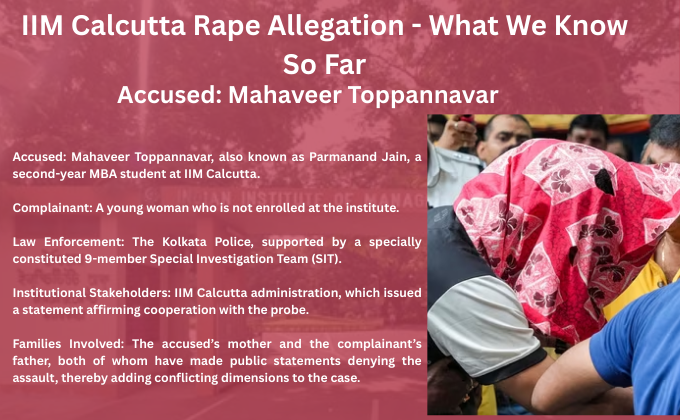One of India’s top business schools, the Indian Institute of Management Calcutta (IIM-C), has found itself at the center of a disturbing controversy. A woman has alleged that she was sexually assaulted inside a boys’ hostel by an MBA student, leading to a full-scale investigation, national media attention, and public debate over campus safety.
Key Individuals Connected to the Case
The incident involves several major parties whose roles are central to the unfolding investigation:
- Accused: Mahaveer Toppannavar, also known as Parmanand Jain, a second-year MBA student at IIM Calcutta.
- Complainant: A young woman who is not enrolled at the institute.
- Law Enforcement: The Kolkata Police, supported by a specially constituted 9-member Special Investigation Team (SIT).
- Institutional Stakeholders: IIM Calcutta administration, which issued a statement affirming cooperation with the probe.
- Families Involved: The accused’s mother and the complainant’s father, both of whom have made public statements denying the assault, thereby adding conflicting dimensions to the case.
Alleged Events That Triggered the Arrest
According to the complainant, the accused invited her to his hostel room under the pretext of offering psychological support. During the meeting:
- He allegedly served her lunch and water.
- She began to feel dizzy shortly after consuming them.
- She lost consciousness and later alleged that she was raped while unconscious.
Following the complaint, police arrested the accused from his hostel room. Evidence collected includes:
- The clothes he wore during the incident.
- His mobile phone and other digital devices.
The Timeline of the Incident
The alleged assault is reported to have occurred in early July 2025. The formal complaint was lodged soon after, and within hours, police conducted an on-site search and arrested the accused. He was presented in court and remanded to police custody until July 19, allowing investigators time to collect further evidence and conduct interrogation.
Location and Security Concerns
The incident allegedly happened inside the boys’ hostel on IIM Calcutta’s Joka campus, located in southern Kolkata, West Bengal. The campus is known for strict access control, raising serious concerns about:
- How a non-student was able to enter and remain inside the hostel.
- Whether institutional security failed to detect or prevent unauthorized access.
This breach has led to widespread discussion about the adequacy of security measures even in elite institutions.
Questions Surrounding the Motive and Consent
The investigation is still determining the nature of the meeting—whether it was consensual or orchestrated with malicious intent. Initial findings suggest that:
- The accused and the complainant knew each other through social media.
- The meeting was initiated under the guise of counselling.
- There are significant discrepancies in the testimonies.
Adding to the complexity, the complainant’s father told media that his daughter had informed him she fell from an auto-rickshaw and did not mention any assault. Similarly, the accused’s mother has denied the charges and criticized the police for procedural lapses.
Police Action and Legal Developments So Far
With the matter gaining national attention, Kolkata Police have deployed a 9-member SIT to ensure a detailed and impartial probe. Investigative steps taken include:
- Seizure of CCTV footage from the campus to verify timelines.
- Initiating the process for a Section 164 statement, which involves the complainant giving a confidential statement before a magistrate.
- Forensic review of medical reports, which allegedly support the complainant's version.
- Custodial interrogation of the accused, who has reportedly refused to unlock his phone, leading to extended police custody.
IIM Calcutta has issued a statement asserting zero tolerance for misconduct and has promised full cooperation.
Broader Implications for Campus Culture
The case has raised deep concerns about the safety of women and visitors within academic campuses. The fact that such an allegation has emerged from a globally respected institution has reignited discussions about:
- Visitor access protocols in residential academic campuses.
- Internal grievance redressal mechanisms.
- The responsibility of institutions in handling criminal allegations transparently.
Final Thoughts
While the investigation is still ongoing, this case has already exposed vulnerabilities in campus security and the complexity of navigating conflicting narratives in sensitive cases. With both digital and medical evidence under review, and high institutional stakes involved, the IIM Calcutta case could set a precedent for how premier academic spaces address and manage crises of this nature.
Justice, accountability, and institutional introspection now rest at the heart of what may become one of the most defining legal episodes in the history of Indian higher education.




